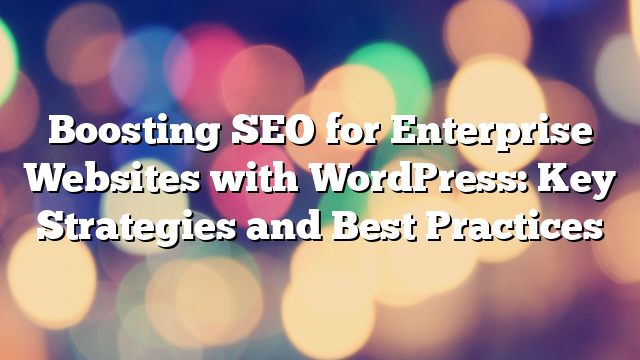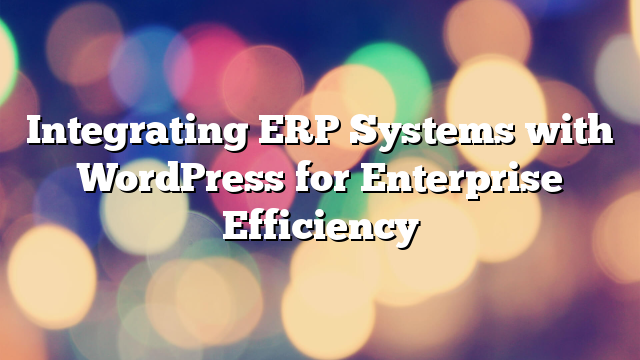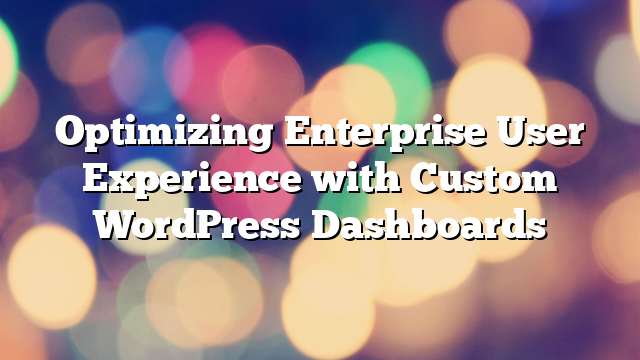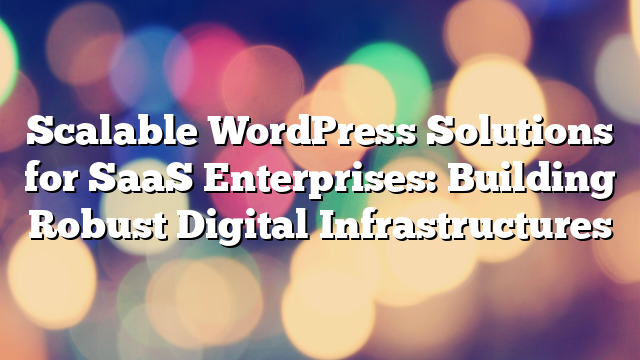Boosting SEO for Enterprise Websites with WordPress: Key Strategies and Best Practices
04.11.2024

In today’s competitive digital landscape, SEO is crucial for enterprises aiming to enhance their online presence, attract high-quality traffic, and drive business growth. WordPress, with its powerful features and flexibility, provides a robust foundation for implementing effective SEO strategies. However, optimizing SEO at an enterprise scale requires a strategic approach to content, technical setup, and user experience. This article delves into the essential SEO strategies and best practices for enterprise websites on WordPress.
1. Optimize Site Speed and Performance
Site speed plays a significant role in both user experience and search engine ranking. Slow websites can lead to higher bounce rates and reduced user engagement, which can negatively impact SEO. For enterprise WordPress sites, improving site speed requires a combination of technical optimizations:
- Image Optimization: Use compressed, optimized images to reduce load times.
- Caching: Implement caching plugins like WP Rocket or W3 Total Cache to save static versions of your pages, reducing server load.
- Content Delivery Network (CDN): Use a CDN to serve content quickly to users based on their location.
These measures not only improve site speed but also create a positive user experience, which can lead to higher rankings.
2. Implement a Strong Content Strategy
High-quality, relevant content is fundamental to enterprise SEO. By aligning content with user intent, enterprises can attract targeted traffic that engages and converts. To maximize SEO benefits, focus on:
- Keyword Research: Identify high-volume keywords and long-tail phrases relevant to your industry.
- Content Clusters: Organize content around clusters that support a central topic. This approach boosts relevance and authority, helping search engines understand the relationships between content pieces.
- Consistent Updates: Regularly update content to maintain relevance and accuracy, especially for industry-specific topics that change over time.
By prioritizing a comprehensive content strategy, enterprise websites can establish authority and improve their ranking potential across key topics.
3. Leverage Structured Data for Rich Snippets
Structured data helps search engines better understand the context of your content, enhancing the chances of appearing in rich snippets, which increase visibility and click-through rates. Using schema markup, enterprises can highlight essential content elements like product information, reviews, and FAQs.
WordPress plugins like Schema Pro or Yoast SEO make it easy to add structured data to your pages, giving you a competitive advantage in search results by showcasing additional information that grabs users’ attention.
4. Ensure Mobile Optimization
With mobile users representing a significant portion of online traffic, optimizing for mobile is essential. Google’s mobile-first indexing prioritizes mobile-friendly websites, so enterprises must ensure their WordPress site is responsive and provides an excellent mobile experience.
Consider using a responsive WordPress theme and testing mobile performance regularly. Tools like Google’s Mobile-Friendly Test can help you identify areas for improvement, ensuring that your enterprise site meets Google’s mobile standards and delivers a smooth user experience across devices.
5. Strengthen Internal Linking Structure
Internal linking is vital for guiding users and search engines through your website. By linking related content, you create a cohesive structure that improves crawlability and relevance. Enterprise websites, in particular, can benefit from a well-thought-out linking structure to support SEO goals across various pages.
Some best practices include:
- Link to High-Value Pages: Use internal links to drive traffic to cornerstone content or high-value pages.
- Use Descriptive Anchor Text: Ensure that anchor text is descriptive and relevant, making it clear to users and search engines what the linked page is about.
- Avoid Overlinking: Keep your internal linking natural and avoid overlinking, which can overwhelm users and dilute link equity.
By enhancing the internal linking structure, enterprises can create a more intuitive site experience that aligns with SEO best practices.
6. Optimize URL Structure and Site Hierarchy
URL structure and site hierarchy play a crucial role in user experience and SEO. For enterprise WordPress sites with extensive content, a clean, organized URL structure helps search engines and users understand the site’s layout. Focus on:
- Descriptive URLs: Use concise, descriptive URLs that include primary keywords and reflect page content.
- Logical Site Hierarchy: Organize your site structure into categories and subcategories, making it easy for users and search engines to navigate.
- Avoid Duplicates: Ensure unique URLs to prevent duplicate content issues, which can confuse search engines and dilute ranking signals.
Implementing a logical structure from the outset sets a strong foundation for SEO and makes it easier to expand your site over time.
7. Monitor SEO Performance with Analytics
Tracking SEO performance is essential for understanding what strategies are working and where improvements are needed. Enterprise websites require comprehensive monitoring, and tools like Google Analytics and Google Search Console provide valuable insights into site traffic, keyword rankings, and user behavior.
To maximize the effectiveness of your monitoring efforts:
- Set Clear KPIs: Define key performance indicators (KPIs) aligned with your business goals, such as organic traffic, bounce rate, and conversion rates.
- Monitor Keyword Performance: Track keyword rankings and adjust content strategies based on performance trends.
- Analyze User Behavior: Review metrics like page views, session duration, and exit rates to understand how users engage with your content.
Regular analysis ensures that your SEO strategies remain effective and aligned with changing user and market demands.
8. Implement Robust Security Measures
Website security is a growing concern, and search engines prioritize secure sites. Enterprise websites are particularly vulnerable to attacks, so implementing robust security measures is essential. Not only does a secure site protect your data and users, but it also signals to search engines that your site is trustworthy.
Some security best practices include:
- Use HTTPS: Ensure your site uses HTTPS to secure data transmission.
- Regular Updates: Keep WordPress, themes, and plugins updated to protect against vulnerabilities.
- Security Plugins: Use security plugins like Wordfence or Sucuri to add extra layers of protection and monitor your site for potential threats.
By prioritizing security, enterprises can build trust with users and maintain a strong SEO profile.
Conclusion
Effective SEO for enterprise WordPress websites requires a strategic, multi-faceted approach that combines technical optimizations, high-quality content, and performance monitoring. By focusing on essential elements like site speed, mobile optimization, and security, enterprises can improve their search engine rankings, drive more traffic, and enhance user satisfaction.
Whether your business is just starting its SEO journey or looking to refine existing strategies, implementing these best practices will help you stay competitive in the search landscape. For tailored guidance and support on optimizing your enterprise website, contact AllWebDev today.



